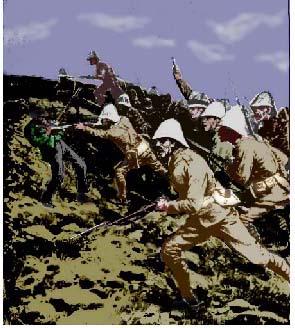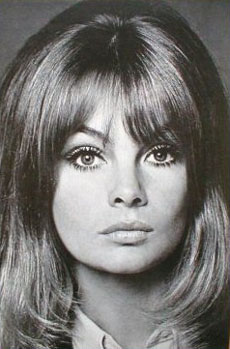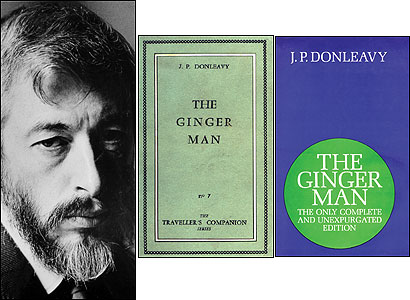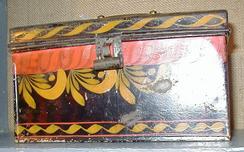
The Liverpool football club (British professional soccer team) are playing an important match tomorrow (Sunday, Feb 26). As BBC Sport puts it, "a home victory over mid table Manchester City [will] take them level on points with second placed Manchester United" in their league. "Mid table" means in the middle of league standings. This season Liverpool has won 13 of 18 matches in the Premiership league, including the last two, and are unbeaten in 10 at home (the Anfield stadium).
{Update Sunday, 26 February 2006, 14:09 GMT: Says BBC Sport: "Liverpool 1-0 Man City: Harry Kewell fires in Liverpool's winner despite Danny Mills' efforts to block his shot Kewell's goal was only his second of the season Harry Kewell's first-half goal was enough to sink Manchester City and put Liverpool level on points with second-placed Manchester United."}That's the football game.

The death is Susan Sontag's. When she succombed to cancer at the end of 2004, I read some of the obits and reflective appreciations of her life and work, and did a blog search to see what unrestrained adulation and vituperation there might be. The results were interesting but unsurprising. Here are links to a represenative sampling:
Susan Sontag, Remembering an intellectual heroine, by Christopher Hitchens in Slate;
US author Susan Sontag dies at 71 from the BBC;
Susan Sontag, Social Critic With Verve, Dies at 71 from the New York Times; and
I wish I had kicked Susan Sontag, by Kevin Myers in the Telegraph.
What did surprise me was a sequence of messages about Sontag on the usenet newsgroup for Liverpool FC fans. Here's a link to the group on Google Groups:
uk.sport.football.clubs.liverpool. Go there to get a feel for the ambience; the group is raucus, unrestrained, and casually obscene (in the language it uses), but it also has it's own code of behavior and members keep one another in line. So what did they say about Sontag?
You can find the discussion thread here:
Susan Sontag RIP. Here's a brief summation:
Tojo Hoki:
Another kopite passes away.
bwahahahahahaha.
BlueRoo:
Are you for fucking real? Gobshite...
Tojo:
actually, I liked her.
I liked her....really.
Q:
Well said
-z-:
Overrated and that grey streak was really annoying.
WTH:
Yes, overrated, but that doesn't mean she wasn't good. ;)
Blue Dave:
who was susan sontag anyhow?
I thought about this set of messages a little and appreciated it for pretty much covering the Sontag territory in a brief a space as could be done, but I also wondered what the first writer meant by kopite. Was this a slur, some kind of praise, or a joke? Turns out that's not an easy question to answer.
Kopites are Liverpool fans, so probability is on the side of praise (as in she's one of us). It might have been meant ironically, but the writer denied this, so praise it probably is. But
search "kopite" on the discussion list and you'll find plenty of unflattering usages. Kopites may be fans, but they seem also to be stooges, dupes, or numskulls, as in the phrase "NONCE KOPITE MONG." (No, actually, I don't know what nonce and mong mean but clearly not flattering.) So the writer may have meant that Sontag was a naive enthusiast or something along those lines; or, as WTH says: overrated, but also good.

So where does this word kopite come from? Kop was the name of terraces at one end of the stadium at Anfield. It was literally a "stand," just a sloping plot of land on which spectators stood, as many as 28-30,000 of them, with no place to sit down.
The terraces were replaced in 1994 and celebrated a decade later in a museum exhibition of photographs:
The Kop's Last Stand - Museum of Liverpool Life. The exhibition's web page says:
The original all-standing Kop, which stood from 1906 to 1994, played a key part in the history of the soccer team during its glory years when players captured top trophies. The Kop's Last Stand tells the fascinating story of the stand where thousands of fans jostled and swayed as they sang, chanted, cheered and jeered. It focuses on the highs and lows experienced on its hallowed terraces.
Selected photographs from the exhibition

My favorite photo in this group is the one on the right whose caption reads: "Not only were Kopites the noisiest supporters but they were also the best dressed. Men in collar and tie were a common sight on the Kop long before jeans and replica shirts became the fashion. In this image from the 1950s you can even see tram drivers and conductors who have turned up in their uniforms."
 | This photo shows The Kop from the outside in the 1920s before it was given a roof. You can see that it was a kind of embankment entered at its back from the top. |

Bloomfield Stadium showing The Kop; source: Project Gutenberg
We know that kopite comes from The Kop, but how did that get its name? The museum site says:
The Kop at Anfield dates back to 1905-06. At the end of that season which saw Liverpool lift the second of their league championships the directors at the club decided to reward the loyalty of the fans by building a new brick and cinder banking at the Walton Breck road end of the ground. It was christened as the Spion Kop by Ernest Jones [a reporter for The Echo] in memory of the many scousers who died in battle over a hill in South Africa by the same name during the Boer War. [Scousers are Liverpudlians "because Scouse, a meat and vegetable stew, was once the favoured food of almost everybody who resided there" says this site].
So, then, what is or was this hill in South Africa and its battle?
There are many sources of information on this. See the
Wikipedia article for a listing of some. Spion Kop just means Lookout Hill in Dutch. In the battle, which took place in 1900, the Boer commandos, coming up the steep side of the hill, defeated British regular troops, coming up the gentler slope. The fight took place over two days during which both darkness and fog kept both Boers and British from knowing who was winning.
There's a good first-person narrative from the Boer side,
Commando by Deneys Reitz. The book, a journal of the Boer War by a young man who served with the Boer forces, is described
here. He says "at nightfall [of the first day] we were holding the blood-spattered ledge [at the summit] with a mere handful of rifles." And during the next day: "the battle remained stationary, the heavy close-range rifle-fire continued hours after hour, and the tale of losses mounted while we lay in the blazing heat." Here are extracts from the rest of the narrative:
I saw a strange incident during the morning. Near me was a German named von Brusewitz. He had been an officer in the German army, but the year before he had run a civilian through with his sword during some scuffle in a Berlin cafe. There was a great outcry over the incident, and to allay popular clamour the German Emperor broke him from his regiment. They say that in Germany the word 'Brusewitzerei' is still used to denote the arrogance of the officer caste. However that may be, von Brusewitz was now on top of Spion Kop, where he seemed bent on getting killed, for although we warned him not to expose himself too recklessly, he paid no heed, and repeatedly stood out from among the rocks to fire.
As the English soldiers were so close to us this was sheer folly, and after he had tempted providence several times the inevitable happened. I saw him rise once more, and, lighting a cigarette, puff away careless of the flying bullets until we heard a thud, and he fell dead within a few feet of me, shot through the head.
We were hungry, thirsty and tired; around us were the dead men covered with swarms of flies attracted by the smell of blood. We did not know the cruel losses that the English were suffering, and we believed that they were easily holding their own, so discouragement spread as the shadows lengthened.
Batches of men left the line, openly defying Red Daniel, who was impotent in the face of this wholesale defection, and when at last the sun set I do not think there were sixty men left on the ledge.
[Following a retreat down the hill in the dark,] the first thing to do was to quench our raging thirst and that of our horses at a spring near by. We could get no coherent information and stood discussing what to do next, for we did not know that the English had also been fought to a standstill, and that they in turn were at that very moment retreating down their own side of Spion Kop. We fully believed that the morning would see them streaming through the breach... [The commandos were in chaos and beginning to desert, when] Louis Botha, the new Commandant-General, addressed the men from the saddle, telling them of the shame that would be theirs if they deserted their posts in this hour of danger; and so eloquent was his appeal that in a few minutes the men were filing off into the dark to reoccupy their positions on either side of the Spion Kop gap. I believe that he spent the rest of the night riding from commando to commando exhorting and threatening, until he persuaded the men to return to the line, thus averting a great disaster.
We woke with the falling of the dew and, as the sky lightened, gazed eagerly at the dim outline of the hill above, but could make out no sign of life.
Gradually the dawn came and still there was no movement. Then to our utter surprise we saw two men on the top triumphantly waving their hats and holding their rifles aloft. They were Boers, and their presence there was proof that, almost unbelievably, defeat had turned to victory—the English were gone and the hill was still ours.
We were soon hastening up the slope past the dead until we reached yesterday's bloody ledge. From here we hurried across to the English breastworks, to find them abandoned. On our side of the fighting-line there had been many casualties, but a worse sight met our eyes behind the English schanses.
In the shallow trenches where they had fought the soldiers lay dead in swathes, and in places they were piled three deep.
The Boer guns in particular had wrought terrible havoc and some of the bodies were shockingly mutilated. There must have been six hundred dead men on this strip of earth, and there cannot have been many battlefields where there was such an accumulation of horrors within so small a compass.
Here are statements from two British soldiers quoted in
The Boer War, by Thomas Parkenham:
[(p. 310) John Atkins wrote:] I shall always have it my memory -- that acre of massacre, that complete shambles, at the top of a rich green gully with cool granite walls (a way fit to lead to heaven) which reached up the western flank of the mountain.
[(p. 301) Private Joe Packer wrote:] We climbed up this 'ere hill - cor, God it was a climb - you climbed up so far and you came to a big flat rock and you had to go all the way round ... cor it was stinkin' 'ot it was ... and we laid out there firing at one another, us and the Boers - the Boers was up above us, see - they'd got us in a trap like ... I couldn't see all round but I could 'ear blokes shoutin' you know, blokes that was getting 'it and all that ...
Some illustrations, photos, and a map of the battle:



Boers at Spion Kop, 1900 - source: Project Gutenberg















 The Liverpool football club (British professional soccer team) are playing an important match tomorrow (Sunday, Feb 26). As BBC Sport puts it, "a home victory over mid table Manchester City [will] take them level on points with second placed Manchester United" in their league. "Mid table" means in the middle of league standings. This season Liverpool has won 13 of 18 matches in the Premiership league, including the last two, and are unbeaten in 10 at home (the Anfield stadium).
The Liverpool football club (British professional soccer team) are playing an important match tomorrow (Sunday, Feb 26). As BBC Sport puts it, "a home victory over mid table Manchester City [will] take them level on points with second placed Manchester United" in their league. "Mid table" means in the middle of league standings. This season Liverpool has won 13 of 18 matches in the Premiership league, including the last two, and are unbeaten in 10 at home (the Anfield stadium).  The death is Susan Sontag's. When she succombed to cancer at the end of 2004, I read some of the obits and reflective appreciations of her life and work, and did a blog search to see what unrestrained adulation and vituperation there might be. The results were interesting but unsurprising. Here are links to a represenative sampling:
The death is Susan Sontag's. When she succombed to cancer at the end of 2004, I read some of the obits and reflective appreciations of her life and work, and did a blog search to see what unrestrained adulation and vituperation there might be. The results were interesting but unsurprising. Here are links to a represenative sampling:  So where does this word kopite come from? Kop was the name of terraces at one end of the stadium at Anfield. It was literally a "stand," just a sloping plot of land on which spectators stood, as many as 28-30,000 of them, with no place to sit down.
So where does this word kopite come from? Kop was the name of terraces at one end of the stadium at Anfield. It was literally a "stand," just a sloping plot of land on which spectators stood, as many as 28-30,000 of them, with no place to sit down. 





 My favorite photo in this group is the one on the right whose caption reads: "Not only were Kopites the noisiest supporters but they were also the best dressed. Men in collar and tie were a common sight on the Kop long before jeans and replica shirts became the fashion. In this image from the 1950s you can even see tram drivers and conductors who have turned up in their uniforms."
My favorite photo in this group is the one on the right whose caption reads: "Not only were Kopites the noisiest supporters but they were also the best dressed. Men in collar and tie were a common sight on the Kop long before jeans and replica shirts became the fashion. In this image from the 1950s you can even see tram drivers and conductors who have turned up in their uniforms."





 I do a "Friday Quotation" for the blog I run at work. I'm cross-posting this week's provocation from William Gass:
I do a "Friday Quotation" for the blog I run at work. I'm cross-posting this week's provocation from William Gass:

 I can't always bike to work. Friday I had to go to the HMO lab for blood work in preparation for my annual health assessment next week. So I drove and listened to Louis Armstrong along the way. Homebound, I got to the
I can't always bike to work. Friday I had to go to the HMO lab for blood work in preparation for my annual health assessment next week. So I drove and listened to Louis Armstrong along the way. Homebound, I got to the  Here are three MP3 files. The first is the shortest, just the part of the solo that caught my attention:
Here are three MP3 files. The first is the shortest, just the part of the solo that caught my attention: 
 We had a Neflix of the 2004 film,
We had a Neflix of the 2004 film,  Half the cast of her latest Off-Broadway play walked out and filed a multi-million dollar law suit alleging she "asked one female cast member to 'feel her up', groped another's breast in a bar and made sexual advances on several other men and women. It describes a game of 'truth of dare' played with the cast in which Harris asked some of the male actors to touch her." The production still on the right shows Glenn Close as Diana.
Half the cast of her latest Off-Broadway play walked out and filed a multi-million dollar law suit alleging she "asked one female cast member to 'feel her up', groped another's breast in a bar and made sexual advances on several other men and women. It describes a game of 'truth of dare' played with the cast in which Harris asked some of the male actors to touch her." The production still on the right shows Glenn Close as Diana.













